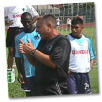Phil Lundin Interview
Phil Lundin is the Head Men’s Track & Filed coach at the University of Minnesota. Phil has consistently produced great 400 meter runners and outstanding jumpers. He has his PhD in Biomechanics. He is a great friend, someone who I turn to when I have questions about training. We are both Garrison Keillor fans, I always kid Phil that the difference is that he actually lives in Lake Wobegon and grew up among Norwegian bachelor farmers and I grew up in California with Italian gardeners.
What are most essential requirements for a successful conditioning program?
A clear idea of your constituency in regards to training age and competitive demands so your training reflects appropriate training progressions and exercise selection.
What are the most common mistakes in conditioning?
The generous application of general work in the general prep or off-season year after year in the career of an individual athlete.
What is "functional training" from your point of view?
How important is specificity?
What aspect of conditioning athletes is most difficult and how have
you tried to address it?
With the plethora of information available how can you determine what is best? I stick with tried and true methods & am basically conservative (not politically, however!). In reading basic research, it is fun to take the findings and put theory into practice based on my interpretation of the data...this is dangerous, but what the hell?
Where do you stand on nature versus nurture? How much difference can
What is the sure sign that a self proclaimed conditioning guru is not
What do you differently with the female athlete in terms of conditioning?
I do not work with females, so I am not in a position to answer....
What has been the biggest innovation in training that you have seen
during the course of your career and where is the biggest room for
innovation in training athletes?
What's the biggest issue in training athletes today?
Who has been a role model in your career and why?
What are the biggest professional challenges have you had to face?
What do you enjoy most about what you do? Dislike?
Did there come a time in your career where you were faced with a "fork
in the road?" If so, do you ever revisit the decision you made or
didn't make? I have a time when I had to make a choice between pursuing a Ph.d in philosophy and sport vs. that of a sport science....I went the sport science route because I thought it was more pragmatic....I should have stuck with philosophy.
What inspired you to get into the field you are in?
Is failure ever valuable? Only if you learn from your failures....
Which changes now taking place in your field that should be
encouraged, and which resisted? We need more women in the coaching ranks....given all the opportunities to compete and the greater numbers of females competing, why are there not more female coaches? I have my own answers, but it still puzzles me....


1 Comments:
Vern and Phil -
I am a distance coach and I have come across a message board thread that is begging for your comments, collective or individual. The original poster is advocating general strength for HS distance athletes, yet the thread digresses to a point where someone is advocating "cross training on an elliptical machine"
LetsRunThread
Disclaimer - I produced the DVD in question, yet I wanted to share the thread with you both as an example of how far we need to go in the sport of track and field to get people thinking "holistically" in terms of appropriate athletic pedagogy. We don't need athletic young men and women in 8th and 9th grade hoping on the elliptical and doing more sagital plane work.
Post a Comment
<< Home